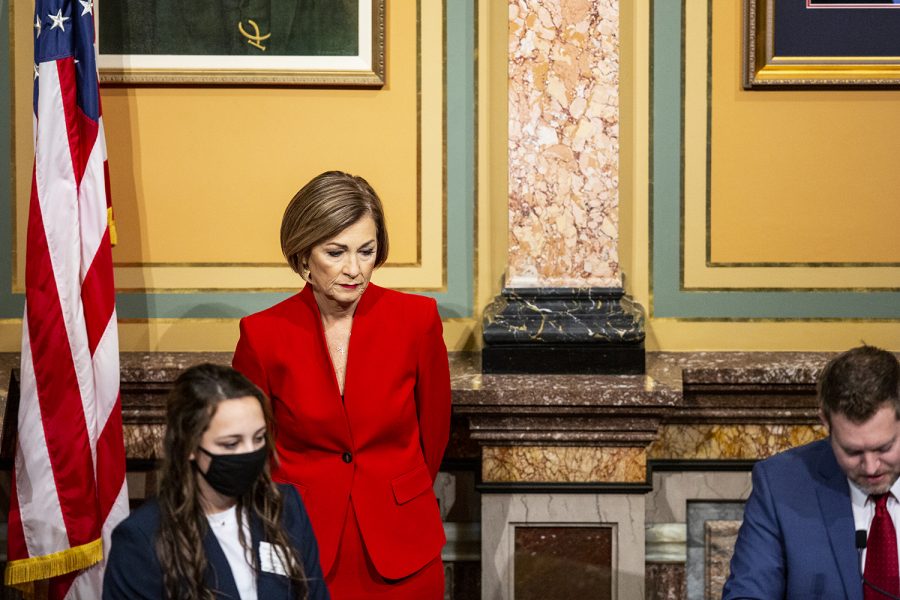Homes for Iowa receives 10 million from COVID-19 relief package
At the Housing Iowa Conference in Cedar Rapids on Sept. 8, Gov. Kim Reynolds announced that $100 million of COVID-19 relief would be given to housing. Homes for Iowa, a prison rehabilitation program, received $10 million.
Ryan Adams for the Daily Iowan
Gov. Kim Reynolds listens to Senate President Jake Chapman speak during the State of the State address in the house chamber of the Iowa State Capitol on Tuesday, Jan. 12, 2021 in Des Moines. Gov. Reynolds highlighted in the address expansion of broadband internet, a push for in-person learning, and economic recovery from the COVID-19 pandemic.
September 20, 2021
Millions of dollars in American Rescue Plan funding will be going to a program that provides job training to incarcerated people by building homes in Iowa.
Gov. Kim Reynolds announced Sept. 8 that $100 million would be spent fixing the housing shortage in Iowa, with $10 million from that fund going to Homes for Iowa, a program in which incarcerated people build houses.
“It’s a program designed to train offenders in trades that are in super high demand,” said Chad Squires, a site supervisor for Homes for Iowa. “Construction framing, dry walling, HVAC plumbing, electric and those sorts of things. And then to help in the demand for housing in rural communities.”
Homes for Iowa is associated with Iowa Prison Industries, a program that employs incarcerated people to produce various products, often paying far less than minimum wage.
The Homes for Iowa program started in 2019 and is modeled after a similar program in South Dakota. In just this past year, Homes for Iowa built 24 homes. Squires said the program is hoping to build 36 to 40 in 2022.
RELATED: Want to make Iowa City more affordable? Build more high-rises
The homes are newly constructed and are “moderately priced” said Mike Norris, the president of the Board for Homes for Iowa.
The people in the program are from Newton Correctional Facility, a minimum-security prison in Jasper County, that has approximately 1,050 people currently serving their sentences.
Scott Hawes, program director of Iowa Valley Habitat for Humanity, said building a house can be quite expensive, especially in today’s economy.
“Some other factors that have pushed the cost of building higher include supply chain issues caused by COVID and just in general there’s a lack of skilled labor,” Hawes said. “All of those factors are kind of pushing the cost of building new houses to be pretty high.”
Iowa Valley Habitat for Humanity, however, has not received any funds from the COVID-19 relief fund.
Norris said that the intention is to create an “employer pipeline”, in which the incarcerated people are released with job prospects and knowing which employers would be willing to hire them.
“The funds are going to benefit the organization by allowing this to grow faster than what we would have already,” Norris said. “When we can grow a little faster, we can train more men, we can build more houses. If we build more houses, then we can sell more houses to communities and buyers that didn’t need a product like this.”



